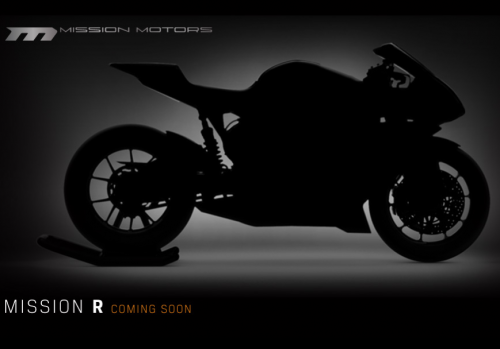Mission R design
First, let's talk aesthetics - because for all the many exciting technical developments we've seen in the electric motorcycle world, we've never seen a battery-bike that looks this damn hot.
The carbon-fiber front end fairings seem to take a few cues from late-model Honda CBR600 super sports as they sweep back to join the "tank," the seat unit recalls the tasty backside of the KTM RC8, the trellis frame faintly evokes the Ducati name – then immediately updates that look – and the single sided swingarm and forged Marchesini 10-spoke rims are the sort of thing you find on top-flight custom sportsters.
Some effort has clearly gone into making the rather industrial electric power unit a bit more attractive, but the battery packs are flat, matte black. Still, if this was a petrol bike, it would immediately be recognized as one of the better-looking machines on the market. Perhaps the only real styling complaint we'd make is that it looks a little too much like a regular super sports machine and isn't bold enough in declaring it's an electric.
Mission R performance
One-hundred and forty-one horsepower and 115 ft-lb of torque propel the Mission R to a top speed over 160mph in a single gear ratio, using a liquid-cooled, 3-phase induction motor. Of course, it's not that simple; setting up an electric race bike is much more about tuning the power curve to preserve limited battery power than it is about peak output figures. Hence, the MissionEVT battery modules with their built-in battery management system are where a lot of the research and development goes.
Battery modules are cased in carbon fiber. They can store up to 14.4 kW-h of energy, and battery packs are swappable between race events to keep the Mission R topped up on power. Through 3G and WiFi data connectivity, pit crews can adjust the bike's throttle mapping, battery management and regenerative braking systems on the fly for maximum performance.
Mission R Chassis
The frame, custom designed for the Mission R, uses billet aluminum and chrome-moly tubing to keep the weight down. It also employs the motor as a fully stressed member, and the swappable battery pack as a semi-stressed member. This helps keep the bike down to a size that Mission claims is smaller than a 600cc sports bike – although it would be fascinating to know how much the total package weighs, given the very public troubles Chip Yates has struggled with in that department.
Ohlins TTX is pretty much the best suspension you can buy, it's used by World Superbike teams, it uses technology derived from MotoGP prototypes and now it comprises the bouncy bits on the Mission R. At the front are two FGR-000 TTX25 gas-charged forks, at the rear it's a TTXC36 shock and linkage. You can get a similar suspension setup to trick up your scooter for around US$13,000.
Moving Forward
The Mission R's immediate purpose is to compete in the TTXGP electric race series - but if the Mission One provides any examples, there's every chance that Mission Motors will also take it down to Utah and go for an electric land-speed record on the salt flats.
No mention has been made yet of a roadbike, but all the development in the electric racing sector is focused on improving and honing performance electrics to build into butt-kicking battery-powered roadbikes.
Bring on the 2011 TTXGP season, these bikes are improving in leaps and bounds. It's not hard to imagine them taking over at the top levels of racing within a couple of decades.
Source: gizmag





new Mission R superbike